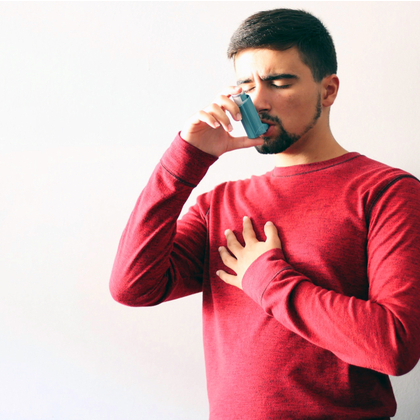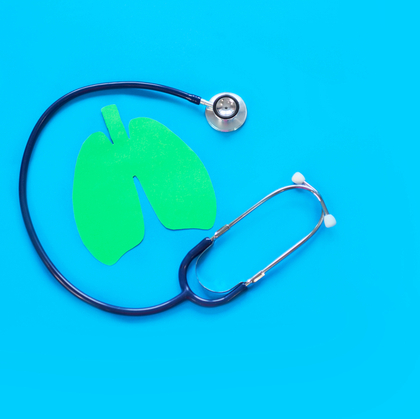Chronic Obstructive Pulmonary Disease (COPD) isn’t a single condition: it’s a term that describes a number of lung-related diseases, including chronic bronchitis, emphysema and chronic obstructive airways disease.
Those who have COPD may have one of these conditions or more – a mixture of chronic bronchitis and emphysema, for example. What everyone with COPD has in common, however, is long-term damage to their lungs.
And while some people may not have even heard of COPD, it is in fact one of the most common respiratory diseases in this country, with three million people currently thought to be living with the disease (though, according to the NHS, only about 900,000 have been diagnosed)(i).
Most of those affected are diagnosed with COPD when they’re in their 50s. However, it’s thought that COPD can start to affect you when you reach your mid-30s. It also affects more men than women, though cases in women are rising(i).
What are the symptoms?
People with COPD experience breathing difficulties that can affect many aspects of their everyday lives. These include a persistent cough with phlegm, frequent chest infections and breathlessness, especially during periods of physical activity. This is caused by a narrowing of the airways, which makes it harder for you to breathe properly.
If you have chronic bronchitis, the tubes or airways that carry oxygen to the lungs – called the bronchi – become inflamed and cause the production of mucous in the airways, which in turn makes you cough.
With emphysema, on the other hand, the air sacs (alveoli) in your lungs become damaged and lose their elasticity, which can make your airways more narrow – making it more difficult for you to breathe.
Other symptoms of COPD may include a persistent chesty cough, wheezing, breathlessness and frequent chest infections, especially during the winter. People with COPD can also lose weight and feel tired all of the time. According to the American Lung Association anxiety is common in people with COPD too (ii).
Mild or severe?
If you have a mild case of COPD, you may only experience symptoms – such as feeling breathless and a chesty cough – during the winter or after having a cold. If your COPD is more severe, however, you could suffer symptoms on a daily basis (though in winter, your symptoms may well get worse).
Many people with COPD also suffer flare-ups (or exacerbations), where their symptoms become severe. As a result, they may have to be admitted to hospital (according to the NHS, a COPD flare-up is one of the most common reasons for people being admitted to hospital in the UK(iii)).
Smoking and COPD
The number one reason why people develop COPD is that they smoke. The number one reason why people develop COPD is that they smoke. According to the NHS, smoking is thought to be responsible for around 90 per cent of COPD cases (iv). So the more you smoke, and the longer you smoke for, the higher your chances are of developing COPD. So the more you smoke, and the longer you smoke for, the higher your chances are of developing COPD.
Tobacco smoke irritates and inflames your lungs, which in the long term can cause permanent damage to your lungs that leads to the development of one or more COPD diseases.
Passive smoking can also increase the risk of COPD. So if you smoke, you may not just be putting your own health in danger but that of those who you live and work with too. Meanwhile, if you are a smoker with a brother or sister who has COPD, your risk of developing the disease yourself is higher than that of other smokers.
Many smokers with COPD, however, don’t get medical help because they dismiss their symptoms simply as a ‘smoker’s’ cough. This may explain why there are only around 900,000 officially diagnosed cases, while the real number of people thought to be affected by COPD is thought to be more like three million (i).
It could also be the reason why most cases are diagnosed in people aged 50 and older, as younger people who are affected may not seek help from their GP because their symptoms may still be relatively mild (COPD is thought to start in adults as young as 35).
Meanwhile, there are other causes of COPD – including chronic severe asthma, air pollution, exposure to fumes, dust and genetic disorders such as alpha-1-antitrypsin deficiency – but these are rare compared with smoking (just one in 100 people with COPD has alpha-1-antitrypsin deficiency, for instance (v)).
Should you quit?
Many smokers who have a lung condition may feel the damage has already been done, so why give up? After all, quitting smoking isn’t easy.
But the good news is giving up smoking could help you feel a lot better by slowing down the progress of COPD considerably, which means you may lose lung function at a much slower speed than if you kept on smoking.
This could help you to live longer and be healthier for longer – plus you could save a considerable amount of money. Even if you’re 65 or older, giving up smoking can help, with experts claiming that it’s never too late to quit (according to the British Lung Foundation, your lungs will work better even if you stop when you’re 60 or older, with stopping at 30 giving you 10 more years of life (vi)).
Even if you’re a smoker who hasn’t experienced any COPD symptoms, giving up is your best chance of reducing the odds of developing the disease in the future.
Not only that, but quitting will also reduce your risk of developing other serious smoking-related diseases, including smoking-related lung cancer and heart disease.
Help with quitting
Research suggests that you are up to four times more likely to give up smoking successfully if you combine the support available from NHS stop smoking services with products called nicotine therapy replacement (NRT) such as patches, gum and lozenges (vii).
Stop smoking services provide expert advice and encouragement to help you give up, including free one-to-one support and access to NRT products on prescription.
-
Local services are available throughout England – visit the Smokefree website to find one near where you live.
-
If you live in Wales, Stop Smoking Wales offers support sessions – find out more about locating support near you.
-
In Scotland, Smokeline offers free face-to-face support with giving up (visit NHS Scotland for more details).
-
Stop smoking services are also available in Northern Ireland – a list of services is available here.
Also click here for more information about smoking and tips on giving up.
COPD: diagnosis and treatment
If you have any of the symptoms of COPD – such as breathless and/or a persistent chesty cough – it's important to see your GP as soon as possible, because the sooner you get treatment, the better.
One of the tests your GP may offer you is called spirometry, which is a breathing test that checks how well your lungs work. When you breathe into a machine called a spirometer, it measures the volume of air you can breathe out in one second as well as the total amount of air you breathe out. If the results are lower than normal for someone your age, your airways may be obstructed.
Other tests you may be offered help rule out other conditions with similar symptoms. You may, for instance, have a chest x-ray – which can show if you have a chest infection or lung cancer – or a blood test to check for anaemia (this too can cause shortness of breath). And to make sure you don’t have asthma, your GP may suggest a peak flow test, which measures your breathing using a peak flow meter at different times over a period of several days.
What are the treatments?
If the results of your tests show that you do have COPD, the treatments you may be prescribed include inhalers and/or tablets.
There are different types of medications available, what type you take – and whether or not you take a combination of medicines – will depend on how much your COPD has progressed and the severity of your symptoms. You may also have to try different medicines before finding one that suits you best.
These medications won’t cure your COPD, but they may help slow the progression of the condition as well as relieve your symptoms.
You may also need oxygen treatment if the level of oxygen in your blood is too low when you’re resting or if it drops when you are physically active. Your GP will advise you if you need oxygen. Meanwhile, surgery is an option to a very small number of people with COPD, where badly damaged areas of lung are removed (lung volume reduction surgery).
Most importantly, your doctor will encourage you to give up smoking, as this is the only proven way to reduce the rate of damage to your lungs and the most effective way to help you feel better. Indeed, people who are diagnosed with the early stages of mild COPD may not need any other treatment than giving up smoking.
Living with COPD
There is no cure for COPD. But the good news is there are several things you can do to help manage your symptoms if you’re living with the condition, including the following:
-
Give up smoking
If you’re still smoking, giving up is the single most effective thing you can do to slow down the progress of COPD and to relieve your symptoms. For more information, visit the British Lung Foundation Helpline to download a free copy of its booklet, How to stop smoking: it’s never too late to quit. -
Keep as fit as possible
According to the NHS, exercising regularly can help improve the symptoms of COPD as well as your quality of life (viii). Before you launch into a new exercise plan, ask your GP if you might benefit from a structured programme of pulmonary rehabilitation. This is provided by experienced healthcare professionals, and is designed to help people with lung problems such as COPD. The British Lung Foundation website has information on pulmonary rehabilitation if you need to find out more. -
Get vaccinated
Make sure you have your free flu jab every year, as your symptoms could get much worse if you catch flu. If you haven’t already had the anti-pneumonia jab, speak to your GP about it to avoid getting an infection during the winter (the vaccination is a one-off, so you only need to have it once). Also try wherever possible to avoid people who have colds, sore throats and other infections. See your GP straight away if you do get an infection, as treating it quickly may help prevent any further lung damage. -
Eat healthily
Some people with COPD are susceptible to losing weight because they use up so much energy breathing. So keep your calorie intake up by eating plenty of nutritious foods (choose smaller, more frequent meals and snacks if you feel too breathless to eat very much). Softer foods that are easier to chew can also be helpful, especially if you’re finding it difficult to chew and breathe while eating. On the other hand, being overweight or obese can make it harder for you to breathe and move around. Ask your GP for advice if you’re struggling to keep your weight at a healthy level (also click here for more information on weight loss). -
Avoid fumes
Try to stay away from places where there may be excessive exhaust fumes – petrol stations or underground car parks, for instance – and look for more natural alternatives to strong-smelling cleaning products and other things like hair spray or air fresheners. -
Stay warm
Wrap up really well if you're going outside when it's cold (try to cover your nose and mouth with a scarf), and keep the indoor temperature at home constant. -
Rest up
Relax as much as possible and try to avoid stress, as it can make your symptoms worse. Make sure you get a good night's sleep whenever possible too, as it may help boost your energy levels. -
Breathe yourself better
Practising certain breathing exercises may help to reduce breathlessness if you do them every day (such exercises are taught as part of pulmonary rehabilitation). Try these:-
Sit comfortably and relax your shoulders, arms and hands. Breathe in gently through your nose and out through your nose and mouth. Try to feel relaxed and calm each time you breathe out.
-
Breathe out with your lips pursed, as if you’re whistling. This slows down your breathing and helps make it more effective.
-
Breathe out when you make a big effort – such as when standing up or climbing stairs. During the hardest part of any action, breathe out, not in (if in doubt, breathe out).
-
Natural support for COPD
As well as taking lifestyle-based self-help measures to improve your condition, there are a few natural supplements that may give you extra support, including the following:
Magnesium
This mineral is essential for several body functions, including muscle contraction. Low levels of magnesium are believed to weaken muscles, particularly those involved in breathing. This may explain why many natural health practitioners recommend eating a diet rich in magnesium to people with lung conditions, including COPD. Some people with COPD may also lack essential nutrients, one of may be magnesium..
Meanwhile, there is some evidence that giving patients a dose of magnesium sulfate 20 minutes after a conventional beta-agonist treatment may help boost the bronchodilator effect of the conventional medicine in acute cases of COPD (ix).
Omega-3 fatty acids
The omega-3 fatty acids found in oily fish such as salmon, fresh tuna, sardines, trout and herring are widely believed to help reduce inflammation in the body. Indeed, the National Institutes of Health in the US has funded a study to find out whether omega-3 fatty acids can combat the inflammation caused by smoking that can lead to COPD (x).
The researchers – from the University of Rochester Medical Center – have early data showing that compounds derived from omega-3 fatty acids may have anti-inflammatory effects on human lung cells.
Meanwhile another study suggests that omega-3 and omega-6 fatty acids could have a controlling influence on the inflammation associated with COPD (xi).
Coenzyme Q10
Some natural health practitioners believe CoQ10 may help improve blood oxygenation in the heart. This substance is believed to increase cell activity and reduce inflammation. One small-scale study has found that taking CoQ10 supplements may boost a COPD patient’s lung function and ability to exercise (xii). In the same study, volunteers with COPD were found to have low levels of CoQ10 compared with those who are healthy.
COPD is a serious condition, but there are ways to slow down its progression and control your symptoms, which could make your life easier. This guide aims to show how a healthy lifestyle can help, when adopted alongside medical advice and treatments. Find out more about a wide range of conditions in our health library
References:
-
Available online: https://www.nhsinform.scot/illnesses-and-conditions/lungs-and-airways/copd/chronic-obstructive-pulmonary-disease
-
Available online: https://www.lung.org/blog/coping-with-copd-and-anxiety
-
Available online: https://www.nhsinform.scot/illnesses-and-conditions/lungs-and-airways/copd/chronic-obstructive-pulmonary-disease#symptoms-of-copd
-
Available online: https://www.nhsinform.scot/illnesses-and-conditions/lungs-and-airways/copd/chronic-obstructive-pulmonary-disease#causes-of-copd
-
Available online: https://www.nhs.uk/conditions/chronic-obstructive-pulmonary-disease-copd/causes/
-
Available online: https://www.blf.org.uk/support-for-you/smoking/why-is-smoking-bad-for-me
-
Available online: https://www.nhs.uk/live-well/quit-smoking/nhs-stop-smoking-services-help-you-quit/
-
Available online: https://www.nhs.uk/conditions/chronic-obstructive-pulmonary-disease-copd/living-with/
-
Skorodin. MS, Tenolder. MF, et al. Magnesium sulfate in exacervations of chronic obstructive pulmonary disease. Arch Intern Med. 1995 Mar 13;155(5):496-500
-
Available online: https://www.urmc.rochester.edu/news/story/can-omega-3-fatty-acids-combat-copd
-
de Battle J. et al., Association between Ω3 and Ω6 fatty acid intakes and serum inflammatory markers in COPD. Journal of Nutritional Biochemistry. 2012 Jul;23(7):817-821. Available online: https://www.sciencedirect.com/science/article/abs/pii/S095528631100132X
-
Fujimoto. S, Kurihara. N, Hirata. K, et al. Effects of coenzymeQ10 administration on pulmonary function and exercise performance in patients with chronic lung diseases. Br J Dermatol ;71:S162-S166. Available online: https://link.springer.com/article/10.1007/BF00226860
Related Posts
Disclaimer: The information presented by Nature's Best is for informational purposes only. It is based on scientific studies (human, animal, or in vitro), clinical experience, or traditional usage as cited in each article. The results reported may not necessarily occur in all individuals. Self-treatment is not recommended for life-threatening conditions that require medical treatment under a doctor's care. For many of the conditions discussed, treatment with prescription or over the counter medication is also available. Consult your doctor, practitioner, and/or pharmacist for any health problem and before using any supplements or before making any changes in prescribed medications.

Christine
Christine Morgan has been a freelance health and wellbeing journalist for almost 20 years, having written for numerous publications including the Daily Mirror, S Magazine, Top Sante, Healthy, Woman & Home, Zest, Allergy, Healthy Times and Pregnancy & Birth; she has also edited several titles such as Women’ Health, Shine’s Real Health & Beauty and All About Health.
View More



